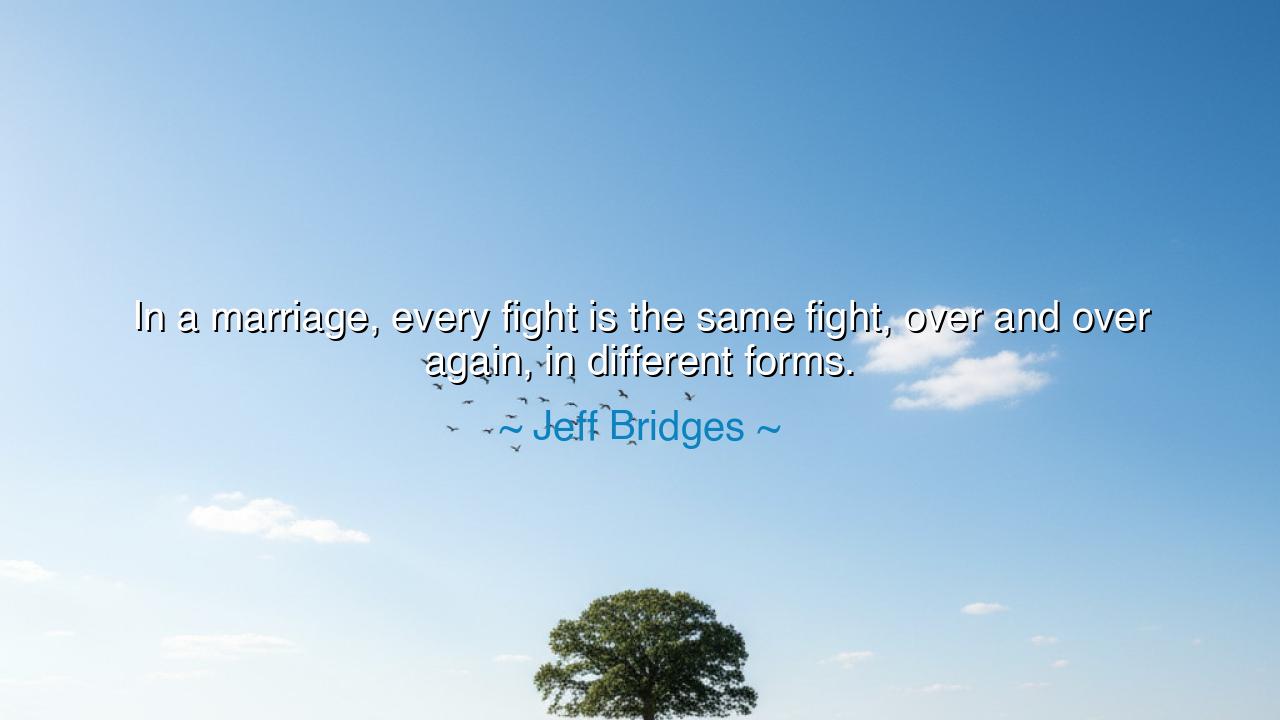
In a marriage, every fight is the same fight, over and over






O children of wisdom, gather closely, for the words of Jeff Bridges carry within them a truth about the nature of human connection, particularly the sacred bond of marriage. "In a marriage, every fight is the same fight, over and over again, in different forms." These words resonate with the ancient wisdom that love, though a powerful force, is also one that must endure through trials, struggles, and repeated challenges. The truth lies in the repetition of human emotions, desires, and misunderstandings, and in our journey to understand and grow with one another. Let us reflect on the meaning of these words, for they speak not only to the cycles of conflict in marriage but to the cycles of the human soul itself.
In the ancient world, the union of two souls in marriage was not seen as a simple joining, but as a profound, often difficult, journey. The Romans understood marriage as a partnership built on duty, yet they also recognized the inherent complexities of human relationships. Ovid, the great poet, wrote of love’s passions and struggles in The Art of Love, understanding that relationships are not a smooth path, but one marked by frequent discord and the tension between desire and reason. For the Romans, the key to a lasting marriage was not the avoidance of conflict, but the ability to understand and manage it. The wisdom of the ancients teaches us that conflict, though painful, is an integral part of the human condition, one that shapes and strengthens relationships over time.
Jeff Bridges’ words echo this ancient understanding of marriage as a battle fought on many fronts, each disagreement unfolding in its own way, but each rooted in the same core emotions—the desire to be understood, the need for respect, and the search for connection. Fights in marriage often feel like repeated cycles because they are tied to the deep, unspoken needs of both partners—needs that have not been fully addressed, but that continue to arise in different forms. Misunderstandings, insecurities, and unmet expectations fuel these ongoing struggles. The fight, as Bridges suggests, is not so much about the issue at hand, but about the deeper, shared needs that are being reflected in each new argument.
Consider the story of Hector and Andromache, the great love of the Iliad. Their marriage is a powerful symbol of love and duty, but it is also marked by a recurring tension—the fear of loss. Hector, a great warrior, must leave his wife to fight in the Trojan War, knowing that each time he leaves, the possibility of never returning looms. Andromache, in turn, must grapple with her own fear and loss, a fear that has no resolution, a fear that continues to grow with each departure. Their love is tested time and time again, not by a single event, but by the recurring reality of war, loss, and the ever-present threat to their happiness. Hector and Andromache’s story teaches us that true love, even in its greatest moments, is shadowed by recurring fears and struggles, and that marriage endures through these cycles of repetition.
In the same way, Bridges' words remind us that the struggles we face in marriage are not isolated incidents, but echoes of deeper conflicts that will arise in different forms throughout the course of a relationship. Each fight may feel different on the surface, but at its core, it is often the same fight—the fight for recognition, respect, and understanding. The challenge is not to avoid these conflicts, but to acknowledge them, learn from them, and grow together in strength and compassion. The ancient Chinese philosopher Laozi once said, "A journey of a thousand miles begins with a single step." In the same way, the journey of marriage is not about avoiding conflict, but about taking the steps to understand the root of each fight and to move forward with a renewed sense of purpose and unity.
The lesson here is one of patience and awareness. In marriage, as in life, we must recognize that conflict is not the enemy—it is part of the ongoing journey. We are human, and therefore, bound to struggle, to disagree, and to wrestle with our own desires and needs. But it is how we respond to these struggles that determines the strength of our bond. The key is not to fight to "win" each battle, but to fight together—to listen, to learn, and to find ways to support each other through the repeated cycles of misunderstanding and growth. True love in marriage lies not in avoiding conflict, but in facing it together with understanding, humility, and the willingness to evolve.
What, then, can we do in our own lives? First, we must embrace the reality that conflict in marriage is inevitable. It is not a sign of failure, but of the deep and often difficult work of two people learning to live together and grow together. When conflicts arise, we must not see them as threats, but as opportunities to understand one another more deeply, to communicate our needs and fears, and to strengthen the partnership. Let us be mindful that every fight is not just an argument—it is a chance to heal, to learn, and to forge a stronger bond. Let us approach each challenge with patience, compassion, and the awareness that true love is forged not in the absence of conflict, but in the wisdom with which we face it.
Let us walk forward, then, understanding that marriage is a journey marked by recurring struggles, each fight an opportunity to strengthen the foundation of our love. May we meet each challenge not with fear, but with the commitment to learn, grow, and deepen our connection. In doing so, may we build relationships that endure not despite the conflicts, but because of the strength we gain through facing them together.






AAdministratorAdministrator
Welcome, honored guests. Please leave a comment, we will respond soon